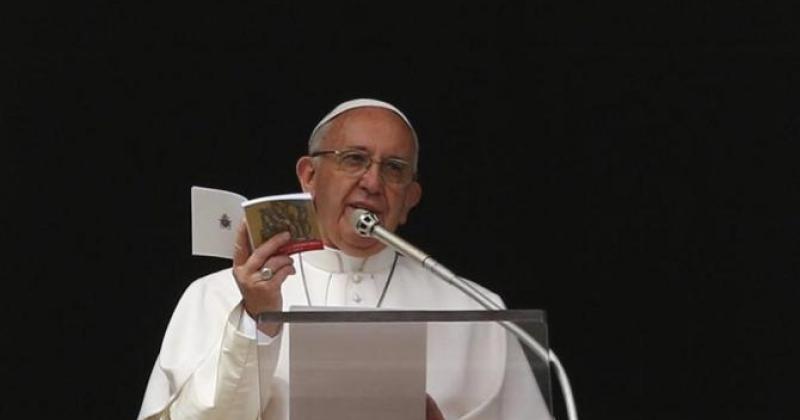Pope Francis celebrated the beginning of the fourth year of his pontificate with an evocative summary of his first three -- preaching to crowds in St. Peter’s Square on Jesus’ mercy towards a woman found in adultery and giving them pocket copies of “The Gospel of Mercy.”
In his weekly Angelus address Sunday, the day marking the fourth anniversary of his election as the leader of the global Roman Catholic church, Francis said that God “does not nail us to our sins” but instead identifies us by our names and wants us to transform evil into good.
Reflecting on the day’s Gospel story -- in which Jesus is brought a woman said to be found in adultery, but refuses to condemn her -- the pontiff said the woman “represents all of us, adulterers before God, traitors to his fidelity.”
“Her experience represents the will of God for each one of us,” said Francis. “Not our condemnation but our salvation through Jesus.”
“He is the grace that saves from sin and from death,” said the pope. “He wrote in the earth, in the dust of which every human being is made, the judgment of God: ’I do not wish that you might die but that you might live.’”
“God does not nail us to our sins, does not identify us with the evil that we have committed,” he said. “We have a name. And God does not identify this name with the sin we have committed.”
“God wants to liberate us, and also wants us to want to be together with him,” said Francis. “He wants our freedom to convert evil into good, and this is possible -- it is possible -- with his grace.”
The pontiff was meditating on a story in Luke’s Gospel, in which a gang of people have prepared to stone the woman for her alleged sin. When confronted with the situation, Jesus bends to the earth to draw in the dirt before asking the one was has not committed any sin to throw the first stone.
Francis said the people did not bring the woman to Jesus “to ask his opinion, but to put him in a trap.”
“If Jesus follows the severity of the law, approving the stoning of the woman, he loses his reputation of tenderness and goodness that fascinates people,” said the pope. “If instead he is merciful he will go against the law, that he said he did not come to abolish but to fulfill.”
Jesus’ response, the pontiff said, caused the gang to put down their stones -- “both those visible against the woman, and those hidden against Jesus.”
Ending his Angelus address Sunday, Francis had volunteers in St. Peter’s Square distribute pocket versions of St. Luke’s Gospel, which he said had been titled “St. Luke’s Gospel of Mercy.”
“I invite you to take this Gospel and read it everyday so that the mercy of the Father will find a home in your heart and you will bring it to whomever you encounter,” the pope told the crowds.
The pontiff also mentioned that the Gospel listed each of the works of mercy and said “it would be beautiful it you learned these by memory because then it is easier to do them.”
Argentine Cardinal Jorge Mario Bergoglio was elected pope, taking the name Francis, on the evening of March 13, 2013.
